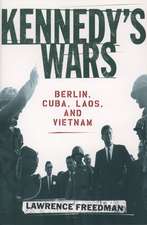Scripting Middle East Leaders: The Impact of Leadership Perceptions on U.S. and UK Foreign Policy
Editat de Sir Sir Lawrence Freedman, Dr. Jeffrey Michaelsen Limba Engleză Paperback – 13 feb 2013
| Toate formatele și edițiile | Preț | Express |
|---|---|---|
| Paperback (1) | 257.97 lei 3-5 săpt. | |
| Bloomsbury Publishing – 13 feb 2013 | 257.97 lei 3-5 săpt. | |
| Hardback (1) | 831.03 lei 6-8 săpt. | |
| Bloomsbury Publishing – 13 feb 2013 | 831.03 lei 6-8 săpt. |
Preț: 257.97 lei
Preț vechi: 296.23 lei
-13% Nou
Puncte Express: 387
Preț estimativ în valută:
49.37€ • 53.61$ • 41.47£
49.37€ • 53.61$ • 41.47£
Carte disponibilă
Livrare economică 01-15 aprilie
Preluare comenzi: 021 569.72.76
Specificații
ISBN-13: 9781441108418
ISBN-10: 1441108416
Pagini: 192
Dimensiuni: 150 x 226 x 20 mm
Greutate: 0.39 kg
Editura: Bloomsbury Publishing
Colecția Bloomsbury Academic
Locul publicării:New York, United States
ISBN-10: 1441108416
Pagini: 192
Dimensiuni: 150 x 226 x 20 mm
Greutate: 0.39 kg
Editura: Bloomsbury Publishing
Colecția Bloomsbury Academic
Locul publicării:New York, United States
Caracteristici
Contributed by leading experts, this timely work will fill a gap in the academic literature.
Notă biografică
Jeffrey Michaels is Research Associate in the Department of War Studies at King's College London. Prior to this, he served as a Lecturer with the Defence Studies Department, and also as an intelligence officer attached to the US European Command and the Pentagon's Joint Staff.Lawrence Freedman is Vice-Principal and Professor of War Studies at King's College London. He has held research appointments at Nuffield College Oxford, IISS, and the Royal Institute of International Affairs. Elected a Fellow of the British Academy, he was awarded the CBE and the KCMG (Knight Commander of St Michael and St George). In 2009, he served as a member of the official inquiry into Britain and the 2003 Iraq War.
Cuprins
1. Introduction (Lawrence Freedman and Jeffrey Michaels) 2. Strategic Scripts (Lawrence Freedman) 3. Emotion and Threat Perception: New Frontiers of Research (Janice Gross Stein) 4. Hitler on the Nile? British and American Perceptions of the Nasser Regime, 1952-70 (Nigel Ashton)5. Seeing Sadat, Thinking Nasser (Dina Rezk) 6. Getting Khomeini Wrong - Perceptions and Misperceptions of Iran's Revolutionary Leadership (David Patrick Houghton) 7. Envisioning Arafat: Views from Washington from Richard Nixon to George W. Bush (William B. Quandt) 8. Waiting for the coup; Oriental Despotism, Saddam Hussein and Anglo-American policy, 1990-2003 (Toby Dodge) 9. British Intelligence and Gaddafi (Christopher Andrew) 10. Western Views of Osama bin Laden (Peter R. Neumann) 11. Desperately Seeking Mahmoud: Misreadings of (and Beyond) Ahmadinejad (William Scott Lucas) 12. Mubarak: The Embodiment of 'Moderate Arab' Leadership (Rosemary Hollis) 13. Conclusion
Recenzii
This is really a marvelous project - timely, important, and with absolutely first-rate authors. Students, professionals in the field, and members of the interested public will find it fascinating and instructive.
Freedman and Michaels have assembled a powerful set of contributors in support of their model of how the US and UK have naively scripted Middle East leaders as players in Western dramas, often casting the same leader at different times in roles as needed reformer, ally of convenience, villain, diabolical enemy, outlaw or irrelevance. This collection of essays should be read by any who reach for arguments from the past for action (or to justify inaction) using slogans such as Munich, Pearl Harbour, Suez, Vietnam, and most recently Afghanistan. This is a substantial contribution to our understanding of the unconscious influences on Western policies towards the Middle East: those who conceived the 2003 invasion of Iraq would have benefited especially from the analytic essay on strategic scripts by Professor Freedman that opens this book.
This collection of well-researched essays describes the images that American and British policy-makers have formed of their ten major Middle East adversaries over recent years - from Abdul Nasser through Arafat and Saddam Hussein to Bashar al-Asad and Ahmadinejad - and how these images have influenced their policies. The portraits are revealing and intriguing, even entertaining. Academics who cannot indulge in entertainment should still find the time to read the valuable introductory chapters, illuminating, with reference to recent advances in cognitive science, the processes by which policy-makers, inevitably swayed by complex emotions, try to make sense of the information coming to them, and devise "strategic scripts" as a basis for action.
Summing Up: Recommended. Upper-division undergraduate, graduate, research, and professional collections.
Freedman and Michaels have assembled a powerful set of contributors in support of their model of how the US and UK have naively scripted Middle East leaders as players in Western dramas, often casting the same leader at different times in roles as needed reformer, ally of convenience, villain, diabolical enemy, outlaw or irrelevance. This collection of essays should be read by any who reach for arguments from the past for action (or to justify inaction) using slogans such as Munich, Pearl Harbour, Suez, Vietnam, and most recently Afghanistan. This is a substantial contribution to our understanding of the unconscious influences on Western policies towards the Middle East: those who conceived the 2003 invasion of Iraq would have benefited especially from the analytic essay on strategic scripts by Professor Freedman that opens this book.
This collection of well-researched essays describes the images that American and British policy-makers have formed of their ten major Middle East adversaries over recent years - from Abdul Nasser through Arafat and Saddam Hussein to Bashar al-Asad and Ahmadinejad - and how these images have influenced their policies. The portraits are revealing and intriguing, even entertaining. Academics who cannot indulge in entertainment should still find the time to read the valuable introductory chapters, illuminating, with reference to recent advances in cognitive science, the processes by which policy-makers, inevitably swayed by complex emotions, try to make sense of the information coming to them, and devise "strategic scripts" as a basis for action.
Summing Up: Recommended. Upper-division undergraduate, graduate, research, and professional collections.
















